Russian interference. Piss-tape kompromat. Montenegrin fake news factories. Shadowy billionaires on both sides of the political divide trying to ignite a culture war. There’s been one hell of an elaborate backstory contrived to explain the shock result of the 2016 US election, but a look through the lens of the National Enquirer suggests that some of it may have been a little more straightforward.
IV/ Electile Dysfunction
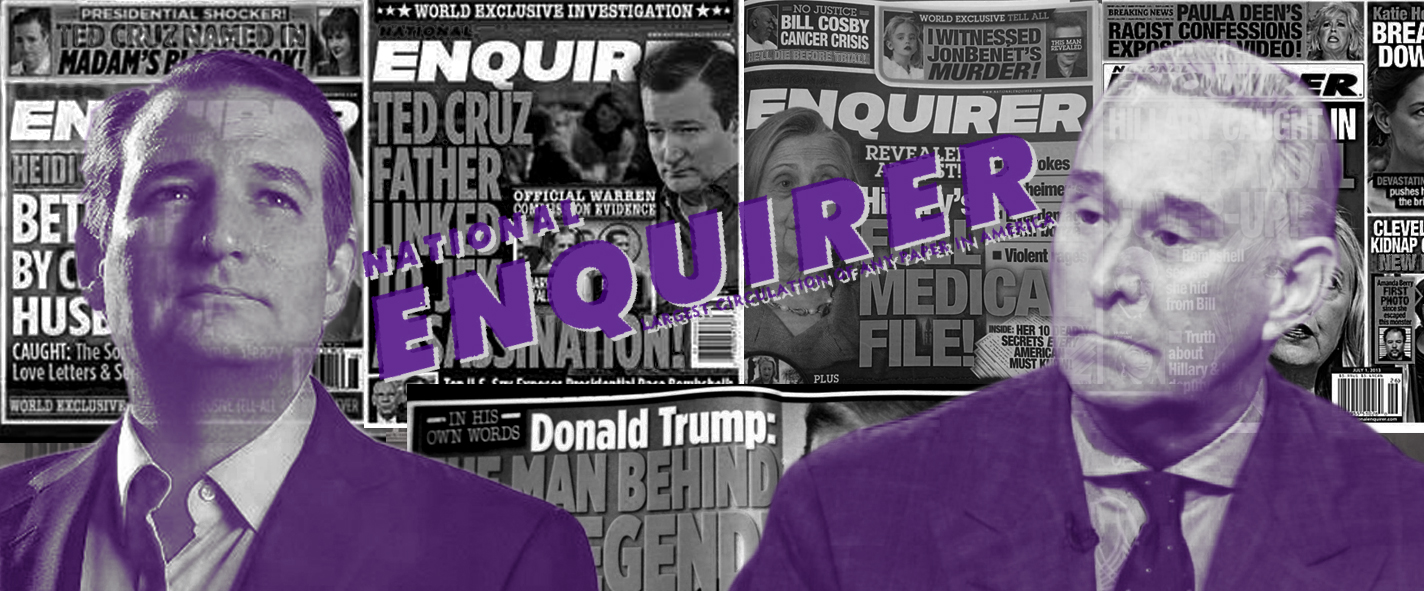
 So far this story has dealt with the mob bosses of New York, the political powerbrokers of Washington, the supermarkets of suburbia and a corporate CEO from Connecticut – but it won’t have escaped your attention that most of the action has been zeroing in on Florida.
So far this story has dealt with the mob bosses of New York, the political powerbrokers of Washington, the supermarkets of suburbia and a corporate CEO from Connecticut – but it won’t have escaped your attention that most of the action has been zeroing in on Florida.
As you may recall, Florida is the location of the Tabloid Triangle. It’s where Gene Pope Junior relocated to escape mob threats. It’s where American Media, Inc. chose to open its offices, where David Pecker runs its daily operations from. It’s the site of Mar-A-Lago, where President Trump spends a great deal of his time. And it’s also the home of the final big player in all of this (but we’ll get to him shortly…)
It’s a unique state, Florida. Not just in the hurricane-shootin’, gator-wrastlin’, dolphin-fuckin’, PCP-snortin’, face-eatin’ sense. The Sunshine State plays a very particular part in American politics too.
Over the last 90 years, Florida has become one of the more reliable bellwethers of the national political mood, managing to predict presidential races with an uncanny accuracy. Since the 1920s, it has only failed to call the wider election correctly twice (in 1960, when it called for Richard Nixon over John F Kennedy; and in 1992, when it called for George Bush Sr over Bill Clinton).
And while there are other swing states that have proved to be just as accurate year after year (New Mexico, Nevada and Ohio, for example) none of them has the electoral clout that Florida has. Florida controls 29 of the 538 electoral votes, making the state as valuable to a presidential candidate as all three of those others, New Mexico (5 votes), Nevada (6) and Ohio (18), combined.
So when Florida was called for Trump at around 22:50 on election night, it was one of the surest signs that he had the national race all sewn up.
Is it a coincidence that all of these things happened in Florida? No. Not exactly. But it’s not exactly a huge conspiracy either.
This might feel like a wildly anticlimactic reveal after 12,000 words of build-up, but we aren’t about to tell you that the National Enquirer was what swung the election for Trump – because we don’t think it was. What’s more, we don’t think the National Enquirer was even seriously attempting to swing it either. That just happened.
However, there was something going on behind the scenes at American Media, Inc. during the election cycle – and that story is much more interesting.
Not only is it interesting, it’s actually something that might yet prove useful to keep tabs on as the Mueller investigation unfolds and America looks toward the 2018 midterms.
So, at the risk of rehashing one of the most overly-hashed political events in living memory, let’s examine how all of these intertwined stories came to play a crucial part in the 2016 Presidential election – and see how the National Enquirer paved the way for the most implausible President of the modern American era: Donald J Trump.
 Primary Targets
Primary Targets
Looking over the full list of 2015/16 Republican primary candidates is like reading a roll call of lost causes. Littered with low-level hopefuls like Rick Santorum, Bobby Jindal and Scott Walker, the GOP was running over with people who had no plausible chance of winning the nomination.
Even among the big-name candidates – your Ted Cruzes, your Marco Rubios, your Jeb Bushes – there was no clear front-runner. Donald Trump gained a lot of headlines for being audaciously improper throughout but there was always the unspoken assumption that he was too clinically unhinged to clinch the actual win.
Yet as soon as anyone other than Trump caught the eye of the national media and started to gain favourable coverage, something strange would invariably happen. They would all get nobbled by AMI titles.
The first to get her wings clipped was Carly Fiorina. Initially considered the rank outsider (even in a field of rank outsiders), her performance in the first round of debates impressed enough people that there was soon talk about her being a serious underdog candidate.
Then this began to happen.
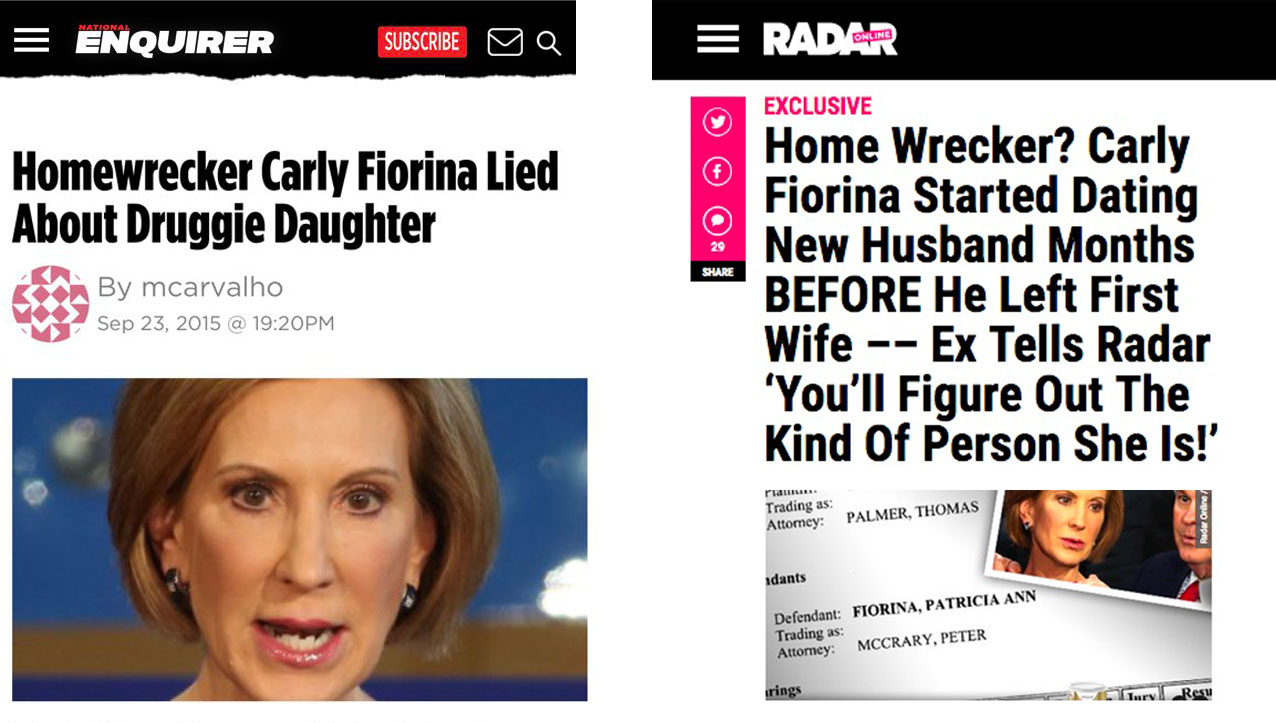
Both the National Enquirer and Radar Online started in on her, trying to coin the nickname ‘Homewrecker’.
Curiously, not only are the Enquirer and Radar both American Media, Inc. properties, they also share the same editor: David J Pecker’s right hand man, Dylan Howard (who was promoted just last week to the position of Chief Content Officer at AMI).
After Fiorina, it was the turn of former neurosurgeon (and ongoing dipshit) Ben Carson, who started to rise in the polls in early October. And sure enough, as soon as he got within five points of Trump’s lead, American Media, Inc. titles began running anti-Carson hit pieces.
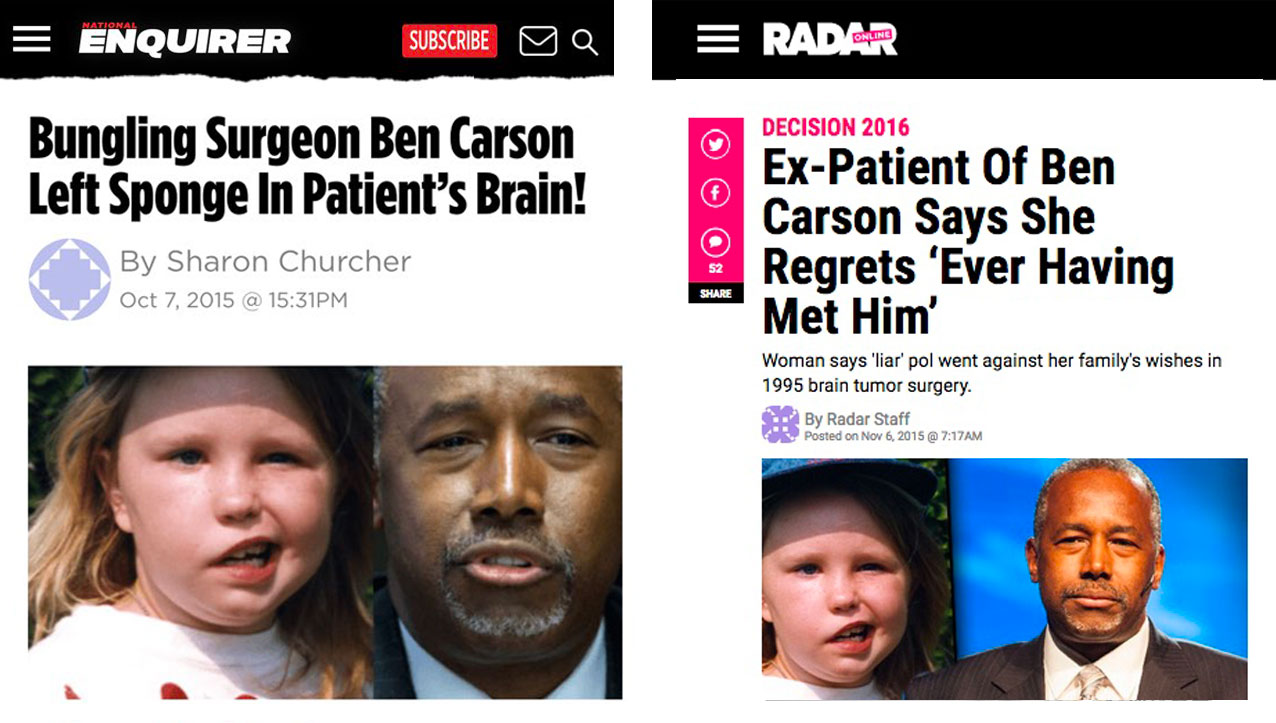
As the primaries approached and various hopeless candidates started to drop out, it briefly looked as if the base might galvanise behind Florida senator Marco Rubio.
So the focus switched.
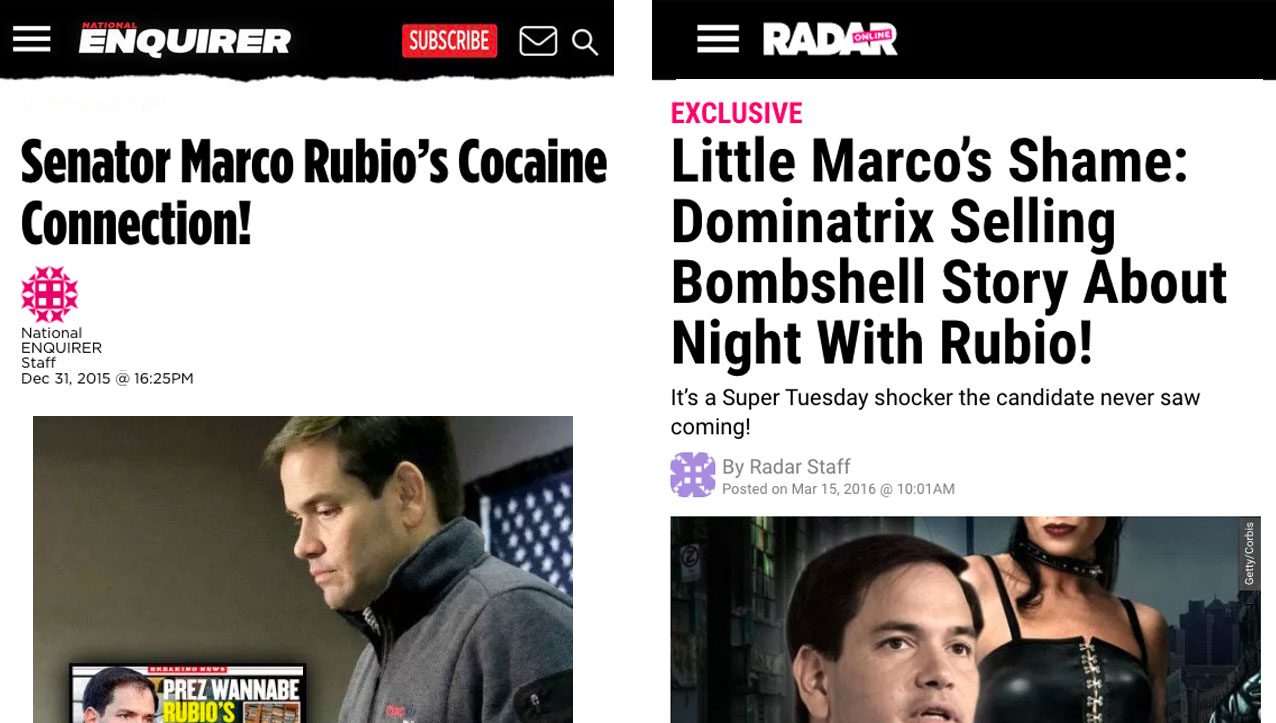
They were even more merciless with former Florida governor, Jeb Bush. Once considered the Establishment candidate, the closest thing the party had to an heir apparent, Jeb struggled to gain any serious traction throughout the primary season.
It didn’t stop American Media, Inc. from going in two-footed on him though.
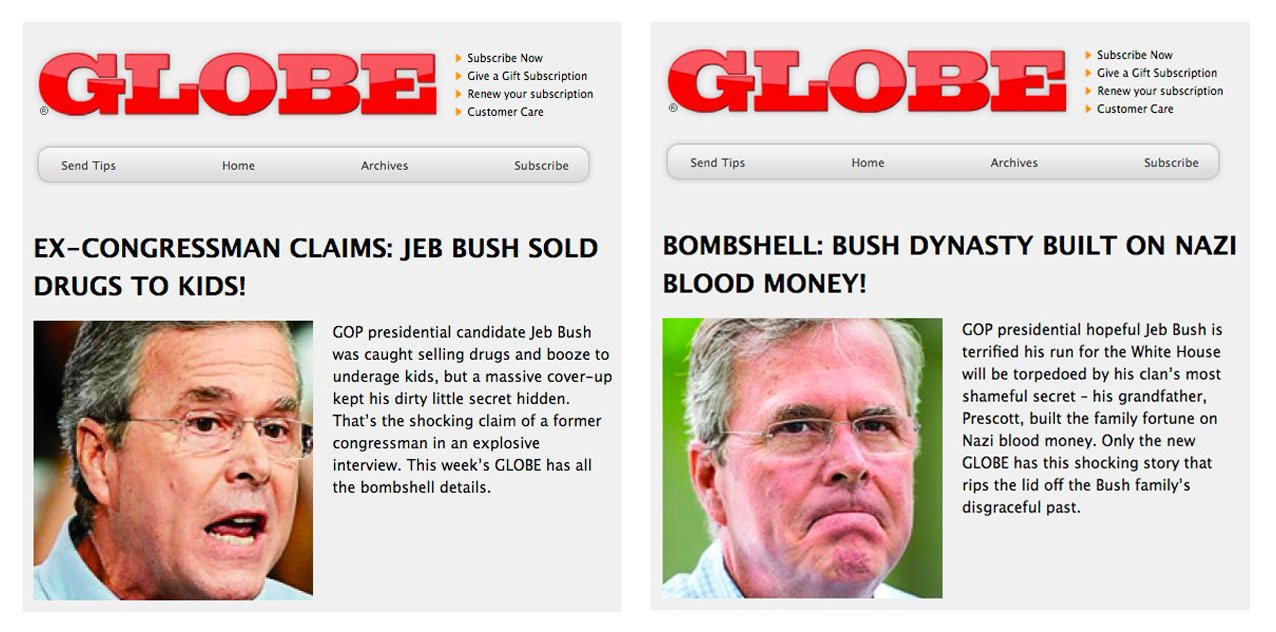
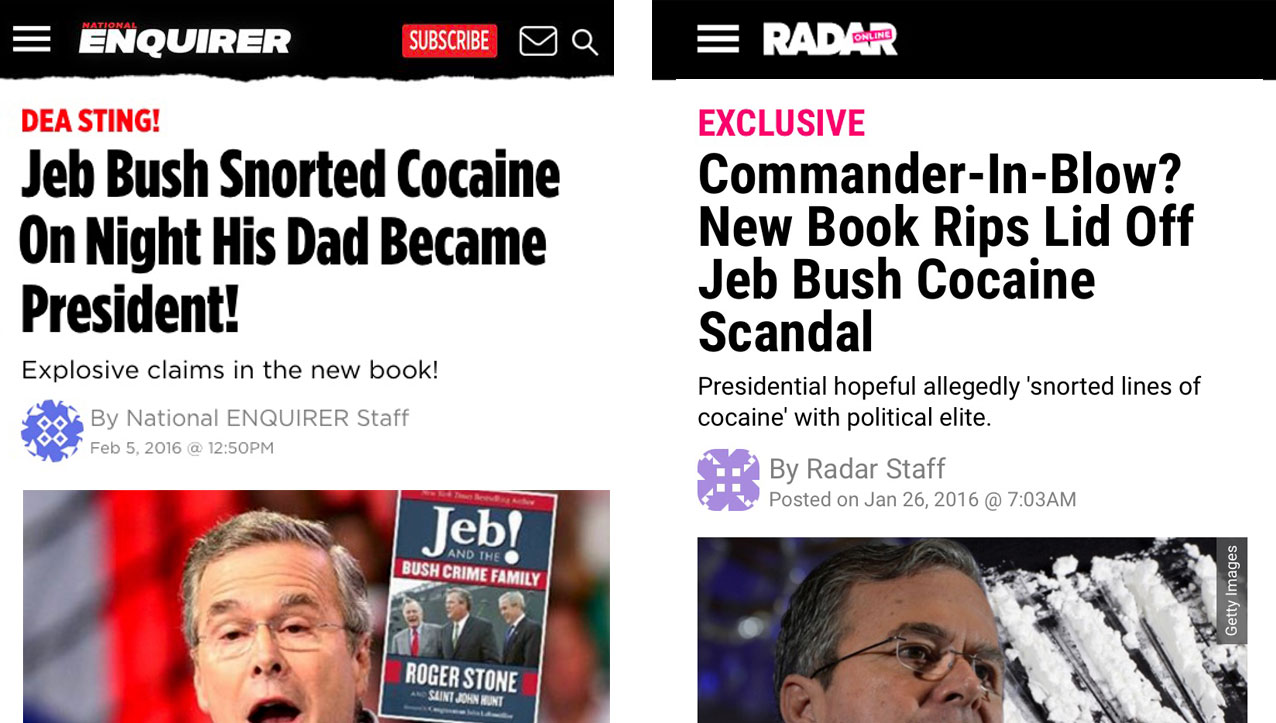
All the while, despite there being many known controversies surrounding Donald Trump (from the mild, pearl-clutching stories of his failed marriages; right through to any of the 3,500 lawsuits he’d been a part of, including a pending case for fraud and a pending case for the sexual assault of a minor) the Enquirer would only ever speak of him in reverent tones.
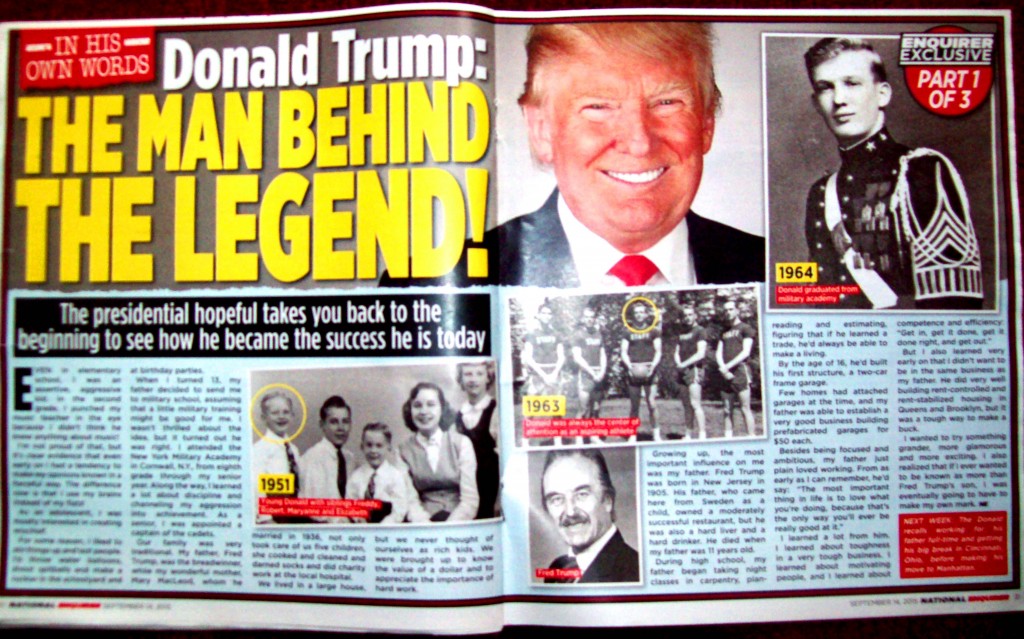
As we mentioned in Part Three, AMI made no bones about buying up potentially damaging stories of him (like the one of Karen McDougal: the Playboy playmate who supposedly had a ten-month affair with him while he was married to Melania) and the closest thing they ever printed to a scandal was that Trump had been lying to American public about… the breadth and depth of his support.
Someone like Trump should have been grist to its mill, yet American Media, Inc. – a company desperate for depravity – would consistently turn its head, inexplicably choosing to try to pin all sorts of mad stories on his milquetoast opponents instead.
And the maddest story of all was saved for Trump’s biggest opponent: Ted Cruz.
Cruzin’ For A Brusin’
In these times of highly partisan, tribalistic politics there is not much that unites Americans on either side of the aisle. But one thing that everyone appears to agree on is this: Ted Cruz is a dick.
Republicans, Democrats, socialists, liberals, conservatives and libertarians alike – everyone hates Ted Cruz.
The point probably doesn’t need hammering too hard but, seeing as some people have gone to great pains to clearly and concisely articulate their disdain for Ted Cruz, it would be a shame to let their efforts go unrecognised.
So here goes:
Senator Al Franken “I probably like Ted Cruz more than most of my other colleagues like Ted Cruz, and I hate Ted Cruz.”
Senator Lindsay Graham “If you killed Ted Cruz on the floor of the Senate, and the trial was in the Senate, nobody would convict you.”
Former Speaker of the House, John Boehner “I have Democrat friends and Republican friends. I get along with almost everyone, but I have never worked with a more miserable son of a bitch in my life.”
Former President of the United States and noted war criminal, George W Bush “I just don’t like the guy.”
Ann Coulter. His Harvard roommate. The actual Church Of Satan. All have gone on record as being anti-Ted Cruz.
Even his own family are wary of him. One of the most memorable pieces of footage of the Republican primaries was of a beleaguered Ted Cruz trying to give his daughter a kiss, only to have her flick his face and recoil in horror.
Everybody. Hates. Ted Cruz.
With such an endless and illustrious cast of characters willing to chat shit about him, you’d think you wouldn’t need to make stuff up in order to get Ted Cruz negative press. But that wouldn’t be much fun now, would it?
The first Enquirer ‘scoop’ on Cruz came in March 2016, right in the middle of primary season, alleging that he was having not one, not two, but five affairs.
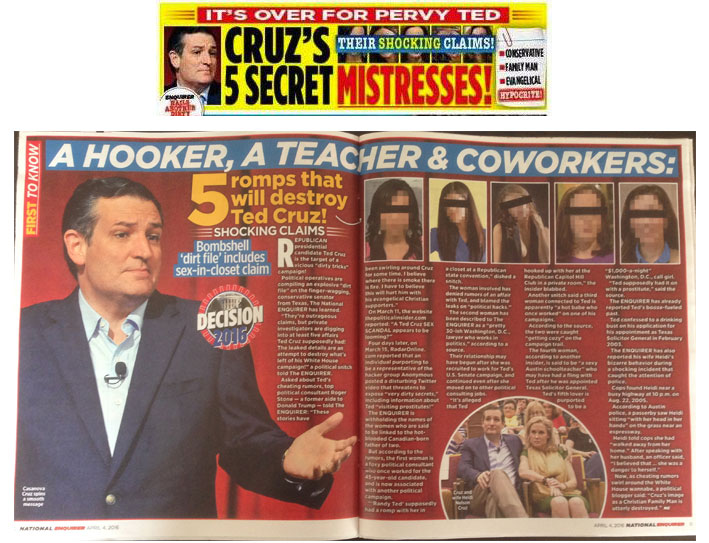
As we have established, Ted Cruz is not a particularly charming person. People are not keen on spending time in his company. It also wouldn’t be overstepping the line to say that he is not a conventionally attractive man. He looks like a young Grandpa Munster, or a hapless supply teacher from Saved By The Bell. Not really the knicker-loosening type.
So already the suggestion that Ted Cruz is ploughing his way through Washington feels implausible. But then the Enquirer decided to up the ante. They tried to implicate him, by extension, in the assassination of JFK.
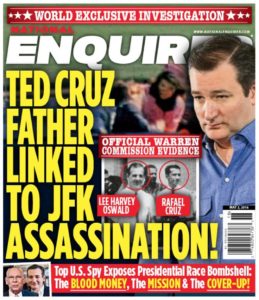
The basis for this story is a single photo of Lee Harvey Oswald standing with a man who, as the article’s expert claims, shares “more similarity than dissimilarity” with Rafael Cruz’s passport portrait.
Not that he is Rafael Cruz, mind. Not even that he’s a real dead ringer for Rafael Cruz. All that the expert can authoritatively say on the matter is that the person pictured looks at least 51% similar to a photo of Rafael Cruz.
(The expert in question, in case you’re curious, is no lesser an authority on the matter than the CEO of the photo digitisation service scanmyphotos.com. Honestly. That, and the First Amendment, is all that’s holding the Enquirer’s story up.)
Of course, it wasn’t long until Trump took the story up and sprinkled his magic dust on it. His “A lot of people are saying…”, his “More and more people are starting to see…”, his “I don’t know if it’s true, I’m just asking the question…”
In fact, we don’t need to paraphrase. Here’s an actual quote: “I don’t know his father. I met him once. I think he’s a lovely guy. All I did is point out the fact that on the cover of the National Enquirer there was a picture of him and crazy Lee Harvey Oswald having breakfast.”
That was enough to get it picked up by the press, thereby forcing Ted Cruz to dignify it with a response. Even Rafael Cruz himself (who is still alive, and could have been asked) came out and denied it flatly. And even though everyone knew this was Trump’s MO, everybody wrote a story about it until it bled into the mainstream news cycle.
Trump’s tactics for media domination have been well documented elsewhere. We don’t need to give you a run down of how or why they work, and they aren’t actually hugely germane to the issue at hand.
The question that it’s more useful for us to ask is this: Who was behind this story?
Gene Pope is dead. Roy Cohn is dead. Trump has neither the wit nor the imagination to come up with something as brilliant as “My opponent’s father helped JFK’s assassin”. It’s possible that David Pecker could have taken the initiative himself, but he’s far too busy overseeing multiple publications to be dreaming up all the content too.
So if not them, who? Who whipped up these stories?
If his hatred of the Clintons and Jeb Bush hadn’t made it clear enough, then the weird JFK angle on the Ted Cruz story was what really gave the game away…
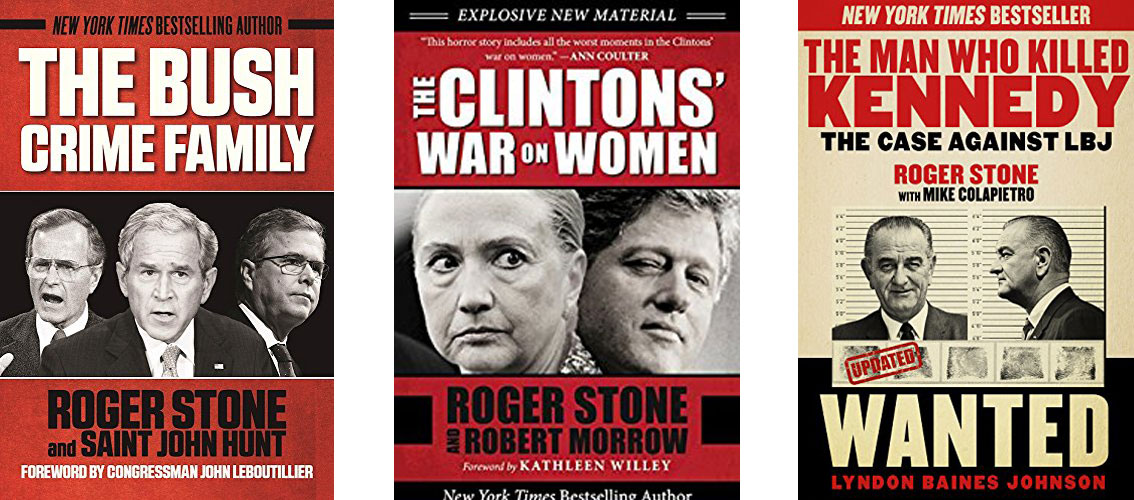
All signs point to that final Florida resident we promised you: Trump campaign advisor, and the self-styled Ratfucker of American Politics, Roger Stone.
 The Stone Age
The Stone Age
Even in an industry of oversized egos and madcap characters, Roger Stone stands alone. Not only does he look like some sort of evil scientist from the Pee Wee Herman universe, his personal brand of politicking makes the dead cat campaigning of operatives like Lynton Crosby look like a Girl Scouts’ bake sale.
A dirty trickster unlike any other, Stone takes a genuine pride in the unethical, lowdown, shit-slinging he’s constantly engaged in. And, as such, the disgraced and the disgraceful are drawn to him like a moth to a flame.
Stone has worked with some truly ignominious all-timers over his career. He first made his name as an advisor to Richard Nixon during the Watergate scandal. Where most people turned their backs on Nixon after he resigned in disrepute, Roger Stone turned his back into Nixon. He got an five-inch tattoo of Nixon’s face inked right between his shoulder blades – such was his devotion to the scandalous side of politics.
It stands to reason then that Stone would be an instrumental figure in convincing a two-bit conman like Donald Trump to run for office – but how did the two first meet? Why, it was thanks to none other than our old pal… Roy Cohn.
Cohn met Stone in 1979 in the early days of the Reagan campaign. By that point, Trump and Cohn had been friends for years so Cohn wasted no time in setting up the pair up. No sooner had he done so, than Trump was signed up as one of the first clients at Stone’s newly-formed “political consulting” firm: Black Manafort Stone.
(Yes. That Manafort.)
Officially, Stone’s involvement with Trump was lobbying on behalf of Trump’s Atlantic City casino concerns, trying to influence legislation regarding gambling – but it wasn’t long before he started to get ideas for other professional collaborations.
Roger Stone had been suggesting that Trump run for office as far back as 1988. Loud-mouthed though he has always been, Trump had no serious political ambition in the 80s. Nor for most of the 90s. But, with the help of the National Enquirer, Stone did manage to briefly turn Trump’s head in 1999.
The 1996 elections had seen a shock result in the shape of the newly established third party, Reform. Reform’s candidate, Ross Perot, had picked up in excess of 8 million votes – the most votes that a third party candidate had gained in US electoral history. Most of these votes were won at the expense of the Republican candidate, Bob Dole (with whom Roger Stone had been working), meaning that Bill Clinton comfortably won his second term. With an 8 million strong majority.
Three years later, Stone was concerned that the Reform party was going to put in a similar sort of showing in the 2000 election. He worried that their likely candidate (Pat Buchanan) would split the Republican vote again, costing George W Bush critical votes and letting Al Gore waltz his way into the White House.
So he hatched a plan.
Roger Stone was going to torpedo the Reform Party.
 Poll Positions
Poll Positions
Stone had a very simple job for Donald Trump; one that really played to his strengths.
All Trump had to do was announce his intention to run, toss around a few damaging accusations about his opponent (Buchanan), make a big enough spectacle out of the pair of them to destroy the Reform Party’s burgeoning credibility and then drop out – ensuring the election would be a clear two-way race between Gore and Bush.
Trump gladly obliged and got stuck right in with the insults. Where most diplomatic politicos would tread lightly, Trump honed the brash, blasé tone he would later use to tell Marco Rubio he had a tiny dick, or insinuate that Megyn Kelly was on her period – by calling his opponent a “Hitler lover” and an anti-Semite.
And, sure enough, he started grabbing headlines.
Stone isn’t stupid though. He knew that, even to the barely-trained eye, the whole thing looked like a set-up. Which is where the Enquirer comes in.
In late 1999, Trump went on Meet The Press to talk about his potential as a presidential candidate. When the host Tim Russert asked Trump about some of the polls conducted, suggesting that 73% of Americans would not vote for Donald Trump for president, this is what Trump had to say.
Trump doesn’t take great umbrage at Russert’s point that his polling is dire, but he does counter with the fact that there is one poll that’s actually very favourable to him. One conducted by the popular supermarket tabloid, the National Enquirer, which said he would win the election outright.
The Enquirer poll he’s talking about did actually exist (which is not always a given with Trump) and it did suggest that Trump, as a third party candidate, would scoop up 37% of the vote: putting him practically neck and neck with George W Bush, and leaving Al Gore for dust.
The poll’s accuracy was never tested in the end as Trump withdrew from the race once he’d caused enough internal turbulence in the Reform party as planned.
How did such a positive poll end up coming to be? Well, as luck would have it, 1999 was the very same year that Trump’s dear friend and media associate David Pecker was installed as CEO and Chairman of American Media, Inc. – taking charge of (among other titles) the National Enquirer.
Still, how the poll came about is not nearly so important as what it ended up revealing though. For it’s this one National Enquirer poll (essentially, the sole bit of positive press to have come out of Donald Trump’s aborted presidential run in 2000) that holds the key to this entire sprawling story.
 Downmarket Research
Downmarket Research
It’s well known that you can generally find a statistic to prove any position you like, but there’s only so much you can realistically fudge. You’d never be able to trick 37% of people into saying they’d vote Ted Bundy or Marilyn Manson for president, for example – no matter how quirkily you worded the question, or how much you’re relying on people’s ignorance.
And it’s tempting to think that Stone and Pecker cooked up some sketchy stats to give Trump a snappy talking point for a Meet The Press interview – but what if this 1999 National Enquirer Trump poll wasn’t fudged? What if it was a legitimately conducted poll?
It might help you to know that opinion polling and canvassing is something that American Media, Inc. has done a lot of under the hand of David Pecker – and for very good reason.
The guiding principle of most tabloid journalism is to give the reader what they want. While many magazines aspire to do just that, most get caught in a compromise. They have to walk a line between pleasing both their audience and their advertisers.
The National Enquirer doesn’t work like that. Without any real advertising revenue to speak of it only has its readership to consider – so they’re free to write whatever they want without fear of upsetting the money men.
However, the flipside of that situation is that the Enquirer only has its readership to keep itself afloat – so it is completely and utterly beholden to them. They are almost totally reliant on their weekly newsstand sales, so they have to be extra careful to ensure that the things they write aren’t putting their readers off.
Thankfully for AMI, David Pecker has this whole thing down to a fine art.
Not only does he have a huge, proprietary database of his magazines’ covers, lead stories and features, he conducts continual rolling telephone surveys to keep an open, ongoing dialogue with his readers (and people like his readers) to find out first hand what they are interested in reading.
Who do they like? Who they hate? What are they keen to hear about? What are they bored of? There’s no better way to find out than asking them directly.
Now, we’re not meaning to suggest that American Media, Inc. has developed a polling system that is more effective or incisive than any of the big professional polling companies (although a lot of the big polling companies absolutely shit the bed in the 2016 election and did a far worse job than the National Enquirer).
Yet what American Media, Inc has done (however inadvertently) is set up its entire operation in such a way that it just so happens to provide a pretty accurate gauge of which politicians are currently in or out of favour with the man on the street.
Because the second it starts to antagonise its readers by going soft on someone they despise (or starts taking swipes at someone they admire) their sales – their only source of revenue – will drop off a cliff.
And when you view things from that angle, suddenly the true nature of these well-timed Enquirer hit-pieces makes a lot more sense.
Ted Cruz didn’t flame out because the Enquirer said that his father helped Lee Harvey Oswald assassinate JFK. The Enquirer said it because they knew Ted Cruz was going to flame out. Their readers had already told them they hated him. Because everybody fucking hates Ted Cruz.
Hillary Clinton didn’t lose Florida to Trump because the National Enquirer had spent the campaign calling her a rape-enabling serial killer with Parkinson’s Disease. She lost Florida because a lot of people have never really liked Hillary Clinton – not even the first time around. Which is why the Enquirer (and other AMI titles) have revelled in printing shit and calling her names for twenty years.



When the National Enquirer broke the habit of a lifetime and endorsed Donald Trump for president, they didn’t do so out of keen political foresight. They did it purely because their market research told them it’s what their readers wanted to hear.
And the reason they wanted to hear that was because they were planning to vote for him come November 2016.
Which they did.
And he won.
This might seem like an obvious point, but when we view the National Enquirer less as a political influencer, and more as a business led by the existing attitudes, beliefs and desires of its customer base, the pieces quickly start to fall into place.
In that regard, American Media, Inc.’s business model is not hugely dissimilar to the custom publishing operation David Pecker created which published Trump’s vanity magazine, Trump Style.
As with any vanity mag, the person paying for it gets control over what’s written. That’s the whole point of it. So in the case of Trump Style, Donald Trump (the customer) would tell David Pecker what he wanted to see on the page and David Pecker (the publisher) would make it happen.
It’s the same thing with National Enquirer and American Media, Inc. – albeit with a crowdfunding micro-payment model. David Pecker starts with a blank canvas and then fills it by asking the people who are going to be paying for it (the readers) explicitly what they want to see there.
This might not seem like a massively critical difference, but it changes everything when you consider that the National Enquirer doesn’t sway its readership so much as it boldly reflects their opinions.
If it feels like we’ve drifted a long way from our starting point, this is where the whole thing comes full circle…
 Loss Of LIFE
Loss Of LIFE
We started this whole story by pointing out that the non-profit organisation Leaders In Further Education (LIFE) had cancelled their proposed annual gala at Mar-A-Lago, and suggested that that could prove to be disastrous for Donald Trump’s presidency. Worse than his dismal approval ratings. Worse than the Russia investigation. Worse than any of the day-to-day setbacks and scandals he seems to be constantly embroiled with.
Why?
Because the CEO and Chairwoman of LIFE is Lois Pope.
Maybe you remember her. We briefly alluded to her in Part Three. She’s the widow and executor of Generoso Pope Junior’s estate: the woman who sold the National Enquirer to form American Media, Inc.
Now, to be crystal clear, it’s important to note that Lois Pope has never had an editorial position on the Enquirer, nor has she had any say in its corporate management since it was sold in 1988. She is in no way one of the Machiavellian puppetmasters of this operation.
And that’s exactly what makes her so useful.
Lois Pope is about the best canary we could possibly hope for in this coalmine. A Trump loyalist. A Florida resident. A mover in Tabloid Triangle society, married to the man who effectively created the industry. She lived and breathed this entire world every day for 35 years. She is about as tuned in to this whole scene as any person could possibly be – without actually being an integral part of it.
She is also a woman who has hosted more than twenty galas at Mar-A-Lago. At least two of them since Trump first said that Mexicans are rapists and murders (and some, we assume, are good people).
If even someone like Lois Pope has apparently given up hope with him, then it could be catastrophically bad news for Trump. As a barometer for what the Enquiring Mind is thinking, there are worse people to take under consideration than Gene Pope’s own wife.
Which is what makes this story from August so significant.
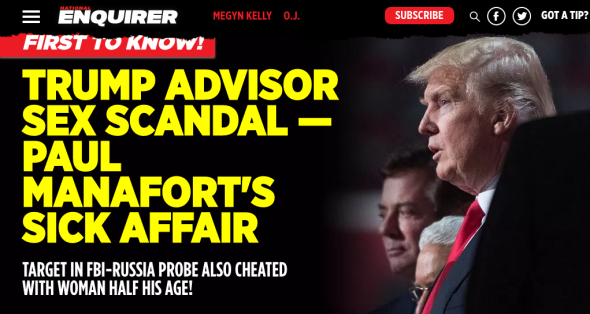
Given the breathless coverage of 2015 and 2016, the mere fact that the words “Trump” and “Scandal” are plastered across the National Enquirer in such close proximity is pretty remarkable.
If you subscribe to the view that Trump is a master of six-dimensional chess, you’d maybe be tempted to suggest that this is him (or Roger Stone) briefing against former Trump campaign chief Paul Manafort, in the hope that David Pecker will run negative stories on him, helping to inoculate Trump against whatever charges Manafort ends up going down for.
Which is possible – but given that this is an administration that can’t seem to keep its story straight on things as basic as crowd size or the goodness of Nazis, it’s hard to believe there is a coherent long-term strategy arranged here.
If you’ll permit us to pose an alternative: What if the tide is turning?
In much the same way that Lois Pope decided to deny Mar-A-Lago her custom after decades of doing business there, could it be that there is now an appetite emerging from the Enquirer readership for anti-Trump stories?
If the readers of the National Enquirer don’t want to hear that there’s any truth to the Russia investigation, then the National Enquirer wouldn’t bother with it. Fox News certainly manages to ignore it, so there’s no reason AMI wouldn’t too. Besides, Pecker has already proved he’s not too proud to buy up anti-Trump stories and have them spiked. Yet, for some reason, they chose not to ignore Manafort.
Perhaps there are sales to be had in Trump-bashing now? A year since his election, with no wall built, with three major territories devastated by hurricanes, with his cabinet burning through hundreds of thousands in private jet hire, with the deadly mass-shootings happening, with neo-Nazis on the march, with his Gallup rating at a historical low, and with Manafort now under house arrest for conspiracy against the United States – enthusiasm for Trump appears to be waning.
Will we see this reflected in the coverage? That all depends on if Pecker is prepared to stand by Trump if it will cost him readers. Without subscribers or advertisers to fall back on, his readers are his only cashcow – and we’ve seen all too clearly what loyalty really amounts to in the world of the billionaire powerbroker when his entire empire is at stake.
In the coming days, weeks and months there is going to be a lot of conflicting reporting. At times there will be too much to process. At others, reporters will be frantically trying to spin stuff out of nothing to keep the momentum up. The partisans will double down again and again on their stances, regardless of what the story is – and it will often be hard to get a sense of what’s actually going on.
But in among all the madness (and we can hardly believe we’re about to recommend this) keep your eye on the Enquirer. Because as soon as you see it start to turn, it means lights out for Trump.




